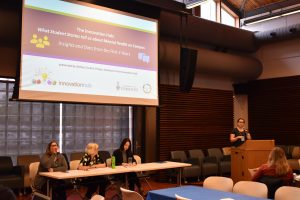
As a graduate student at U of T with a focus in community development, I look a lot at community-based models and theories for change. I firmly believe that by connecting with one another in authentic and needs-based practices, we can find a sense of community for belonging and support. However, this belief often competes with my role in an academic field fuelled by excellence. This is a reality that I am simultaneously proud of and struggling with, as I try to prioritize my studies alongside work, my artistic practice, mental health, and well … the list goes on!
‘Mental health in academia is too often a forgotten footnote. That needs to change.’ —Arnav Chhabra
In light of recent dialogues and initiatives on campus regarding mental health and wellness, the Innovation Hub has been looking at this reality. Over the past three months, our team reexamined the data from our three years of empathy-based inquiries, which include over 400 student voices, to articulate some core themes and insights into how an academic environment can impact one’s mental health and wellness. We also wanted to use these insights to propose possibilities for change, and we were honoured to share our work on these topics with a range of audiences.

I spoke to one such audience at the N x N Conference: Intersections on Wellness and Academia (hosted by the Faculty of Human Biology), where I shared some aspects of our data with a group of students, staff, and alumni. An experience like this is incredible as a space for individuals to share findings among peers, connect with one another, and think together, “What are the next steps?” What struck me most was that throughout the day, the themes we shared from our data continued to be reflected and expanded upon by speakers and audience members, who actively considered how our insights relate to their unique roles at the university. Our themes—‘A Narrative of Excellence’, ‘Finding Community’, and ‘Navigating Resources’—served as a starting point for individuals to locate student needs around mental health that emerge across campus. It takes these types of gatherings—whether in person, online, or through another form of collaboration—to make space for us to understand the emotions and obstacles that individuals feel in academic environments, feelings that we share with one another to some degree. There needs to be a shift in the dialogue around asking for help and reaching out to others who aren’t sure how to ask, especially in communities that uphold a multilevel standard of excellence. We can begin by connecting with one another to consider each individual’s needs, or by reaching out to guide others through experiences that might otherwise become isolating. These experiences can truly impact the mental health and wellness of students and others in academia, and it takes time and community-based dialogues to begin this shift.
I experienced this at first hand when I moved here from Victoria, B.C., to begin my studies in September 2018, then started working at the Innovation Hub over the last six months. I felt incredibly isolated, and any grain of perceived failure directly impacted my physical and mental health. When I began to work outside the scope of my courses, I was shocked by the volume of similar stories that I heard, and by how difficult it is to remain conscious of the factors affecting our mental health while balancing our studies and working. I continue to be moved by the stories that students entrust us with, and by the experiences we learn from, while working with our partners on campus. Sharing the insights from our data and the possibilities that they open for change also shows how design thinking practices contribute to community development, and how we can prototype solutions with others so that they become invested in the growth of well-being, for individuals and for communities.
We sincerely thank Dr. William Ju, the event volunteers, and the Faculty of Human Biology for organizing this event and inviting us to participate. Thanks also to Woodsworth College for providing a wonderful space to share our insights with attendees.
A public report of our findings will be released in Summer 2019. Subscribe to our blog to keep updated on events, projects, and more! To learn more about the data presented and our current work, please connect with Julia Smeed, our Innovation Projects Officer, at julia.smeed@utoronto.ca or at 416-978-8619.
0 comments on “The Power of Student Stories Through Data: Wellness and Academia at U of T”